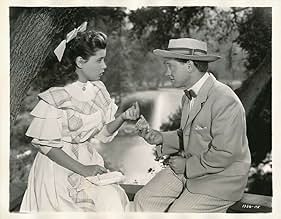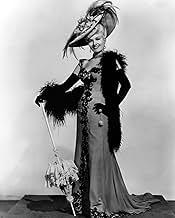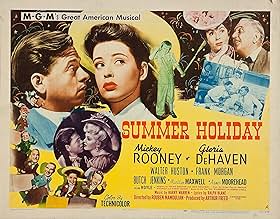Ajouter une intrigue dans votre langueTurn-of-the-century Connecticut. Young Richard Miller, from a middle-class family, loves neighbor Muriel despite her father's objections to Richard's revolutionary ideas.Turn-of-the-century Connecticut. Young Richard Miller, from a middle-class family, loves neighbor Muriel despite her father's objections to Richard's revolutionary ideas.Turn-of-the-century Connecticut. Young Richard Miller, from a middle-class family, loves neighbor Muriel despite her father's objections to Richard's revolutionary ideas.
- Réalisation
- Scénario
- Casting principal
Gloria DeHaven
- Muriel McComber
- (as Gloria De Haven)
Jackie 'Butch' Jenkins
- Tommy Miller
- (as Butch Jenkins)
Anne Francis
- Elsie Rand
- (as Ann Francis)
Charles Bates
- Boy
- (non crédité)
Avis à la une
5jhkp
There are problems with this big-budget Arthur Freed production, directed by Rouben Mamoulian. It's a musical adaptation of Eugene O'Neill's play, Ah, Wilderness!, which was first filmed by director Clarence Brown in 1935.
There's a good cast. You can't find much fault with people like Selena Royle, Agnes Moorehead, Frank Morgan, etc. But for a big MGM musical, Summer Holiday is underpopulated with song-and-dance talent. Marilyn Maxwell and Gloria DeHaven are real singers. Rooney, in the lead, is not. Huston (who had a hit record of September Song), has a few good musical minutes, but at least one of his songs was cut. And anyway, you can't expect Walter Huston to carry the male singing chores in a screen musical.
Mickey did star in musicals before this. But he probably shouldn't have been expected to carry this kind of film. He was a huge talent, but as a musical lead, he was a different type, a showman (as he proved in the hit Broadway show, Sugar Babies, years later). He wasn't a song and dance man, like Donald O'Connor. You don't find yourself eagerly awaiting his next vocal or dance number.
As for his being too old, he is. But even when he was a lot younger, he just wasn't really the type to pull off this naive, bumptious character. He's a good actor, he tries, and he does well, overall. It's just that I didn't buy it and you probably won't, either.
The songs are good, but they don't have a lot of zing. They're pleasant. The numbers themselves are sometimes truncated. The cuts are rather obvious, at times.
The thing I enjoyed most was the recreation of various American paintings (like Grant Wood's American Gothic) in one sequence. It was both charming and satirical.
By the way, I don't know if anyone else noticed, but director Rouben Mamoulian chose to have the costumes and sets done almost entirely in whites, light grays, tans, and other soft, neutral tones. I'm guessing this was in order to contrast with the film's colorful Omar Kiam fantasy sequence.
But the sequence was cut, resulting in a colorless, drab-looking Technicolor film. Only the scene with Marilyn Maxwell, whose costume becomes more flamboyant the more drunk Mickey Rooney gets, remains as a contrast to all that colorlessness.
Mamoulian was clearly a man of talent, and his cast and technical crew were the finest the studio could provide, so it's a shame to report this film was less than the sum of its parts.
There's a good cast. You can't find much fault with people like Selena Royle, Agnes Moorehead, Frank Morgan, etc. But for a big MGM musical, Summer Holiday is underpopulated with song-and-dance talent. Marilyn Maxwell and Gloria DeHaven are real singers. Rooney, in the lead, is not. Huston (who had a hit record of September Song), has a few good musical minutes, but at least one of his songs was cut. And anyway, you can't expect Walter Huston to carry the male singing chores in a screen musical.
Mickey did star in musicals before this. But he probably shouldn't have been expected to carry this kind of film. He was a huge talent, but as a musical lead, he was a different type, a showman (as he proved in the hit Broadway show, Sugar Babies, years later). He wasn't a song and dance man, like Donald O'Connor. You don't find yourself eagerly awaiting his next vocal or dance number.
As for his being too old, he is. But even when he was a lot younger, he just wasn't really the type to pull off this naive, bumptious character. He's a good actor, he tries, and he does well, overall. It's just that I didn't buy it and you probably won't, either.
The songs are good, but they don't have a lot of zing. They're pleasant. The numbers themselves are sometimes truncated. The cuts are rather obvious, at times.
The thing I enjoyed most was the recreation of various American paintings (like Grant Wood's American Gothic) in one sequence. It was both charming and satirical.
By the way, I don't know if anyone else noticed, but director Rouben Mamoulian chose to have the costumes and sets done almost entirely in whites, light grays, tans, and other soft, neutral tones. I'm guessing this was in order to contrast with the film's colorful Omar Kiam fantasy sequence.
But the sequence was cut, resulting in a colorless, drab-looking Technicolor film. Only the scene with Marilyn Maxwell, whose costume becomes more flamboyant the more drunk Mickey Rooney gets, remains as a contrast to all that colorlessness.
Mamoulian was clearly a man of talent, and his cast and technical crew were the finest the studio could provide, so it's a shame to report this film was less than the sum of its parts.
If you are a fan of Mickey Rooney, or if you loved "Ah, Wilderness!" (1935 movie) and "Take Me Along" (Broadway musical version of "Ah, Wilderness!"), you will find this version of Eugene O'Neill's only comedy worth seeing.
Mickey Rooney is in both films. In "Summer Holiday," he does a good job as the older brother, but I liked him better as the little brother in the 1935 movie. Butch Jenkins plays the little brother in "Summer Holiday" (the Mickey Rooney role in the 1935 movie). Somebody must have decided the role was not cute enough, so they gave poor little Butch a lot of extra lines and cutesy costumes. Remembering Mickey's robust performance in the earlier version, I found Butch embarrassing.
The music in "Summer Holiday" is not very inspired. "Take Me Along" has better songs. I don't dislike "Summer Holiday." It just doesn't live up to my expectations of it.
Mickey Rooney is in both films. In "Summer Holiday," he does a good job as the older brother, but I liked him better as the little brother in the 1935 movie. Butch Jenkins plays the little brother in "Summer Holiday" (the Mickey Rooney role in the 1935 movie). Somebody must have decided the role was not cute enough, so they gave poor little Butch a lot of extra lines and cutesy costumes. Remembering Mickey's robust performance in the earlier version, I found Butch embarrassing.
The music in "Summer Holiday" is not very inspired. "Take Me Along" has better songs. I don't dislike "Summer Holiday." It just doesn't live up to my expectations of it.
Quite bland musical version of Eugene O'Neill's gentle comedy play about a family in rural America before the first world war.
MGM made the first (non-musical) version in 1935 under the play's original title, AH, WILDERNESS! That film, which stars Eric Linden, Lionel Barrymore, and Wallace Beery is superb.
Here we get Mickey Rooney (aged 28 playing a high school senior), Walter Huston, and Frank Morgan. Huston and Morgan are OK, but Morgan can't hold a candle to Beery's Uncle Sid.
The rest of the cast here is competent but all the "edge" has been taken out of the original story. Agnes Moorehead plays the old maid aunt, Selena Royle is the mother, Gloria DeHaven is the girl next door, Butch Jenkins is the kid brother (Rooney played the role in the '35 film), and John Alexander plays the blowhard neighbor.
Not helping is the bland and forgettable music score. They would have been better off using real songs from the period.
The main problem is that Rooney is simply too old for this, and his acting is pretty bad. By 1948 he was already about to end his second marriage (first was to Ava Gardner). And here he is trying to play a virginal high schooler. It gets really sticky when he rebels and meets Belle.
In this version Belle is a chorus girl rather than a prostitute. Marilyn Maxwell is a breath of fresh air as the salty, plain-talking, overly made-up woman trying to take the green kid for a few bucks ... until another guy shows up. This is a nicely lit and interesting scene as Belle is "transformed" in Rooney's eyes from the cheap chorus girl into a colorful woman of the world. Maxwell is terrific. It's a great small role; in the '35 version Helen Flint was also terrific.
Bottom line is that this is just a so-so film. It can't compare with the '35 version of the story, and it certainly doesn't come up to the MGM standard for its '40s musicals. The movie was not a box office success.
MGM made the first (non-musical) version in 1935 under the play's original title, AH, WILDERNESS! That film, which stars Eric Linden, Lionel Barrymore, and Wallace Beery is superb.
Here we get Mickey Rooney (aged 28 playing a high school senior), Walter Huston, and Frank Morgan. Huston and Morgan are OK, but Morgan can't hold a candle to Beery's Uncle Sid.
The rest of the cast here is competent but all the "edge" has been taken out of the original story. Agnes Moorehead plays the old maid aunt, Selena Royle is the mother, Gloria DeHaven is the girl next door, Butch Jenkins is the kid brother (Rooney played the role in the '35 film), and John Alexander plays the blowhard neighbor.
Not helping is the bland and forgettable music score. They would have been better off using real songs from the period.
The main problem is that Rooney is simply too old for this, and his acting is pretty bad. By 1948 he was already about to end his second marriage (first was to Ava Gardner). And here he is trying to play a virginal high schooler. It gets really sticky when he rebels and meets Belle.
In this version Belle is a chorus girl rather than a prostitute. Marilyn Maxwell is a breath of fresh air as the salty, plain-talking, overly made-up woman trying to take the green kid for a few bucks ... until another guy shows up. This is a nicely lit and interesting scene as Belle is "transformed" in Rooney's eyes from the cheap chorus girl into a colorful woman of the world. Maxwell is terrific. It's a great small role; in the '35 version Helen Flint was also terrific.
Bottom line is that this is just a so-so film. It can't compare with the '35 version of the story, and it certainly doesn't come up to the MGM standard for its '40s musicals. The movie was not a box office success.
A perfectly enjoyable bit of mid-era Freed Unit MGM, with many of the hallmarks of their greatest musicals. But the real surprise in this film is the extended bar room sequence in which Mickey Rooney is led astray by a wanton showgirl named "Belle," played in an extraordinarily vivid way by Marilyn Maxwell. She positively glows in her many extreme close-ups as she tries to vamp Mickey Rooney down the path of corruption. Her Technicolor costume changes color throughout the scene, reflecting Rooney's increasing drunkenness. As mentioned by other reviewers here, the number is sort of a stand-alone scene that seems rather transplanted from another film altogether...but for this viewer, it's a welcomed shot of "oomph", incongruous or not. One is left wondering why it is that Miss Maxwell is largely forgotten today and wasn't really handed any other roles that fulfilled the promise she showed in "Summer Holiday" (with the possible exception of her equally vivid showing in "The Lemon Drop Kid"). She had a long and busy career, mostly in television...yet her name rings few bells today. Could it be that a certain "Norma Jeane Baker," in largely co-opting her name, sort of pulled the rug out from under her in the process? Bottom-line: If you don't want to see the whole film, tune in about halfway through and catch an indelible star-turn by an indelible star: Marilyn Maxwell. It's her film.
"Ah, Wilderness!" should make a great musical--in fact, it made a very good one on Broadway, as "Take Me Along" in 1959--and this Freed Unit special has some greatness in it, which keeps being undercut. It's beautifully cast, the Technicolor is extraordinary, and the director, the always underrated Rouben Mamoulian, shows a lot of feel for the small-town turn-of-the-century setting and the small crises in the Miller family. But it was a troubled production, and it suffered some ruinous cuts. The editing's frankly sloppy, and misguided things happen that you don't expect to happen in MGM musicals. Mickey Rooney (10 years too old for the part, but he hides it well, and not doing those Mickey Rooney overacting things that often annoy me) and Gloria De Haven (lovely, with a lovely voice) dance fetchingly to "Afraid to Be in Love" on an emerald park lawn, and the number just fades out, no payoff, no resolution. Rooney gets drunk with Marilyn Maxwell in a cheap saloon, and there's supposed to be an Omar Khayam dream ballet (there are production stills), but it doesn't happen, and that scene, too, just fades out. The always-exemplary Walter Huston, who's charming here, rolls up the movie with the curtain line, "Well, spring isn't everything, is it, Essie?", and it's supposed to resonate because he was supposed to sing "Spring Isn't Everything," a sweet ballad similar to the "September Song" Huston introduced in "Knickerbocker Holiday," but that, too, has been cut, so it just seems an odd way to fade out. What's left of the Harry Warren-Ralph Blane score isn't great, but it's quite integrated into the action, and well performed. I caught this again on TCM recently and it's better than I remembered, but I keep wanting it to be better still.
Le saviez-vous
- AnecdotesBelle jeunesse (1948) is a 1948 American musical-comedy film, directed by Rouben Mamoulian and starring Mickey Rooney and Gloria DeHaven. The picture is based on the play "Ah, Wilderness!" (1933) by Eugene O'Neill, which had been filmed under that name by MGM in 1935 Impétueuse jeunesse (1935) with Rooney in a much smaller role, as the younger brother. Though completed in October 1946, this film sat on the shelf until 1948.
- GaffesAt the beginning of the "Stanley Steamer" segment Richard Miller (Mickey Rooney) lights the burner in the steamer then gets in and drives away accompanied by several explosions from under the hood. A Stanley Steamer took several minutes to develop steam and could not be driven immediately, also there was nothing under the hood but a burner and a boiler neither of which would cause explosions of the type shown.
- Citations
Richard Miller: Mankind was better off when we lived in the Dark Ages... when everybody went around naked!
Uncle Sid: Well, maybe so. But today it might interfere with your social life.
- ConnexionsFeatured in TCM Guest Programmer: Michael Feinstein (2015)
- Bandes originalesOur Home Town
(uncredited)
Music by Harry Warren
Lyrics by Ralph Blane
Performed by Walter Huston, Mickey Rooney, Gloria DeHaven, Selena Royle (dubbed by Denny Wilson), Agnes Moorehead, Shirley Johns, Michael Kirby, Frank Morgan, Jackie 'Butch' Jenkins
[Sung by the primary cast in the opening scene montage]
Meilleurs choix
Connectez-vous pour évaluer et suivre la liste de favoris afin de recevoir des recommandations personnalisées
- How long is Summer Holiday?Alimenté par Alexa
Détails
Box-office
- Budget
- 2 258 325 $US (estimé)
- Durée
- 1h 33min(93 min)
- Rapport de forme
- 1.37 : 1
Contribuer à cette page
Suggérer une modification ou ajouter du contenu manquant

























